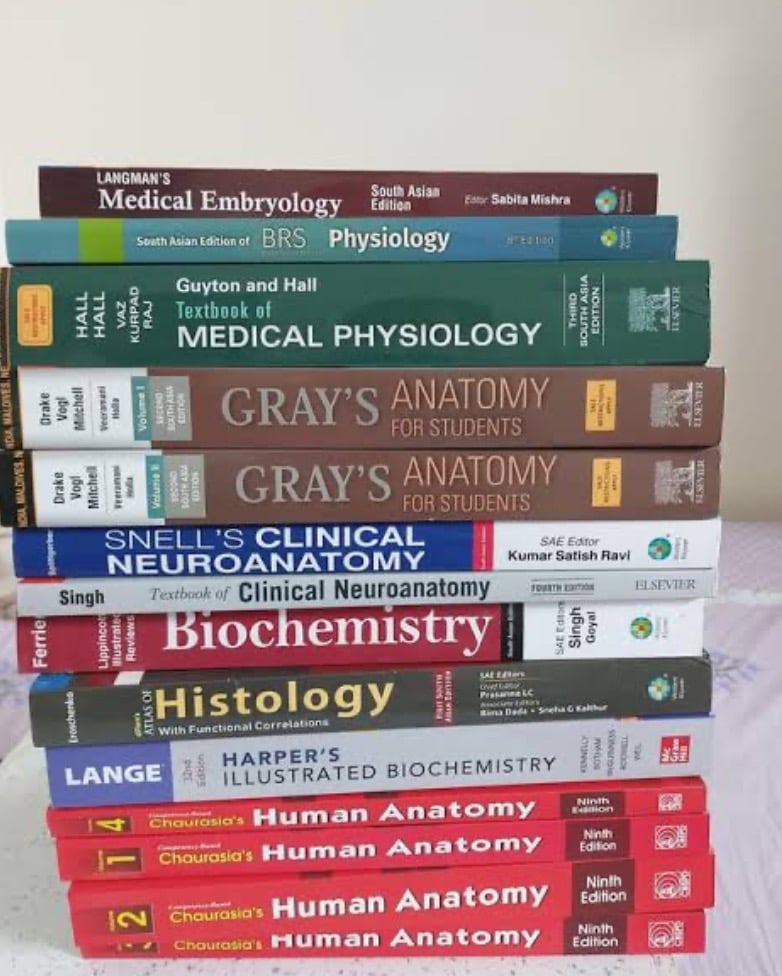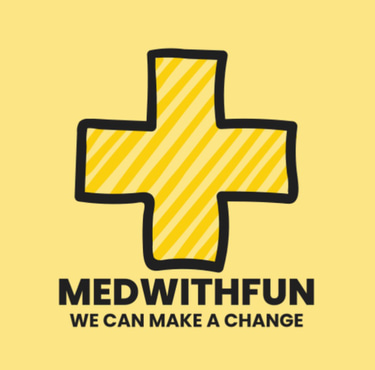best book for mbbs 1st year
MBBS 1st year feels quite hectic to many students as they have recently came from that Neet zone which actually has less syllabus than MBBS and obviously has more competition. Inorder to ace mbbs 1st year and get distinction in each subject they can follow following book recommedation which is as per nmc syllabus and which will also ace your Neet pg preparation!✌🏻
11/11/20243 min read


Essential Guide to First-Year Medical Books
Welcome to this guide for first-year medical students! If you're starting your journey at a medical college, you’re likely juggling three main subjects in your first year: Anatomy, Physiology, and Biochemistry. Each of these subjects has its own set of essential books to help you understand the fundamentals. In this blog, I'll break down the types of books you’ll need—ranging from gold-standard references to more exam-oriented resources—to make your studies more manageable and effective.
Anatomy
1. Gross Anatomy
Atlas of Anatomy: Atlases are crucial for understanding the structure of the human body. Recommended options include Netter’s Atlas of Human Anatomy or Thieme’s Atlas. Atlases focus on visual details, which are essential before diving into more detailed studies.
BD Chaurasia’s Human Anatomy: The main go-to book for exams. It provides a point-by-point breakdown of key anatomical information across four volumes:
Volume 1: Upper Limb & Thorax
Volume 2: Lower Limb, Abdomen, & Pelvis
Volume 3: Head, Neck, & Brain
Volume 4: Neuroanatomy
Gray’s Anatomy: Known as the king of anatomy books, Gray's offers a thorough exploration of gross anatomy. It’s not for the faint of heart due to its depth, but if you're interested in a deep dive, this is an excellent choice.
2. General Anatomy
BD Chaurasia’s Handbook of General Anatomy: This concise handbook provides foundational knowledge of anatomy concepts, like types of tissues, nerves, and blood supply, giving you the basics before you delve deeper.
3. Histology
Inderbir Singh’s Human Histology: A comprehensive book with detailed explanations and color atlases to help you recognize tissue structures under a microscope.
DiFiore’s Atlas of Histology: The gold-standard book for histology. Excellent for understanding intricate cellular structures.
4. Embryology
Inderbir Singh’s Human Embryology: This book simplifies the complex topic of human development, which is often underappreciated but crucial for later clinical studies.
The Developing Human by Keith Moore: The gold-standard book for embryology, highly detailed and clinically oriented, especially useful for those interested in developmental anomalies and pediatrics.
5. Practical Anatomy
Cunningham’s Manual of Practical Anatomy: A must-have for practical classes, this book outlines dissection steps in a structured way. Most students borrow this from seniors, but it’s essential for dissection sessions.
6. MCQ/Review Books
Arvind Arora’s Anatomy: Ideal for MCQs and entrance exam preparation. This review book condenses essential information across anatomy topics and is valuable for those aiming for postgraduate entrance exams.
Physiology
1. Theory
Guyton and Hall Textbook of Medical Physiology: Highly recommended for its comprehensive explanations. It’s a medium-high level book in terms of depth and rigor, balancing thoroughness with readability.
Ganong’s Review of Medical Physiology: The gold standard for those who wish to dive deeper into physiological processes, though it requires a strong foundation in the basics.
K. Sembulingam’s Essentials of Medical Physiology: Provides a simpler, tabulated format and is easier to memorize for exams if Guyton feels overwhelming.
2. Practical Physiology
GK Pal’s Practical Physiology: This book covers practical experiments, including detailed instructions for experiments and the underlying physiological concepts. It’s a great reference for preparing for exams and understanding lab work.
Krishna Kumar’s Review of Physiology: Useful for MCQ practice and exam preparation, especially if you’ve already read Guyton and Hall. The book covers advanced topics from pharmacology, pathology, and clinical aspects as well.
Biochemistry
1. Theory
Harper’s Illustrated Biochemistry: The gold-standard book for biochemistry. This book explains complex biochemical pathways clearly, offering a strong foundation for pharmacology and pathology.
Vasudevan’s Textbook of Biochemistry: Provides a similar standard as Harper’s but with a more structured approach for easy understanding. If Harper’s feels too dense, Vasudevan is a good alternative.
Case-Oriented Approach in Biochemistry by Dr. Rajesh Kambamwar & Dr. Lavina Sinha: Written by professors at GMC Nagpur, this book provides real-life cases to help you understand clinical applications of biochemistry, making it an excellent addition for practical insights.
2. MCQ/Review Books
Rebecca James’ MCQs in Biochemistry: This review book is structured for exam preparation, combining questions from Harper’s, Lippincott, and Vasudevan for a well-rounded review.
Satyanarayana’s Biochemistry: Known as a "passing book" in medical circles, Satyanarayana simplifies biochemistry concepts, making it suitable for students focused on covering the basics.
Final Tips
While this guide covers essential books for each subject, always prioritize understanding over memorizing. Here’s a quick rundown of an ideal study workflow:
Start with an Atlas: Look at anatomical structures before reading about them.
Understand General Concepts: Begin with general anatomy or introductory biochemistry to set the stage.
Primary Reading: Use books like BD Chaurasia (Anatomy), Guyton and Hall (Physiology), and Vasudevan or Harper (Biochemistry).
Practical Manuals: For each subject, practical guides (e.g., Cunningham for anatomy) will prepare you for lab sessions.
MCQs/Review Books: Supplement your primary reading with review books and MCQs to reinforce learning.
With dedication and the right resources, your first-year journey in medical school will be both rewarding and manageable. Best of luck!
